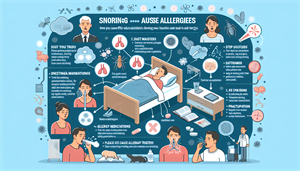
Snoring and Allergies
Ah, the familiar symphony of snoring, a nocturnal nuisance that can fray nerves and disrupt sleep. But have you ever considered why some individuals snore more than others, or why your own snoring might be worse during certain times of the year? The answer could lie in your immune system’s response to allergens, those microscopic irritants that can trigger everything from sneezing to, you guessed it, snoring. Ready to learn more about the connection between snoring and allergies? Let’s get started.
Key Takeaways
Snoring is caused by factors such as obesity, alcohol, smoking, sleep position, nasal congestion, and sleep apnea, with allergies being a common cause due to nasal congestion from allergens. Allergic rhinitis is a major contributor to snoring, triggered by environmental irritants like dust, pet dander, and pollen, and can lead to chronic inflammation, mouth breathing, and disrupted sleep patterns. Addressing allergies can improve symptoms and management of sleep apnea through treatments like intranasal corticosteroids and antihistamines while reducing nasal congestion and snoring.
The Symphony of Snoring: Unpacking the Nocturnal Nuisance
Consider for a moment the mechanics of snoring. This nocturnal noise, often the bane of shared sleeping arrangements, is not a purposeless annoyance. It’s actually a response to restricted airflow during sleep. When we sleep, our bodies are designed to maintain a steady flow of air into our lungs. However, certain factors can interfere with this process, causing the air to flow less smoothly, and leading to the vibrations we recognize as snoring.
Some common factors that can contribute to snoring include: Obesity, alcohol consumption, smoking, sleep position, nasal congestion, sleep apnea. Understanding these factors can help you identify potential solutions to reduce or eliminate snoring. A common culprit? Allergies. Allergens, such as dust mites and pollen, can lead to nasal congestion, one of the most common causes of snoring.
The Anatomy of a Snore
The sound of snoring is produced when the soft palate - that fleshy, flexible part towards the back of the roof of your mouth - vibrates. This happens when air can’t move freely through your nose and mouth during sleep, often because your airways have become narrowed. Imagine trying to drink a thick smoothie through a narrow straw. You have to suck harder to get the smoothie up the straw, and this can cause the straw to collapse on itself. The same thing happens when you have a blocked nose due to allergies. This blockage results in the generation of suction forces that constrict the upper airway, and as air flows past the soft palate, it causes this tissue to vibrate and produce the characteristic sound of snoring.
Swollen or blocked nasal passages can make this problem even worse. They can hinder nasal breathing during sleep, leading individuals to breathe through their mouths, often resulting in loud and disruptive snoring.
When Breathing Becomes a Battle
For some people, breathing during sleep is a constant battle. Conditions like obstructive sleep apnea, obesity, hypothyroidism, lung or heart ailments, asthma, allergies, or anxiety can all contribute to breathing difficulties during sleep. Nasal congestion, often caused by allergies, can result in obstruction or deformation of the sinus cavities, causing a reduction in the nasal airway space and increased airflow speed, which can worsen the issue of snoring and lead to poor sleep quality.
Even the way you sleep can exacerbate the problem. Certain sleeping positions can lead to the narrowing of airways, intensifying snoring. So, what can you do to combat these issues? One simple solution is to adjust your sleep position to ensure that your airways remain open and unobstructed.


